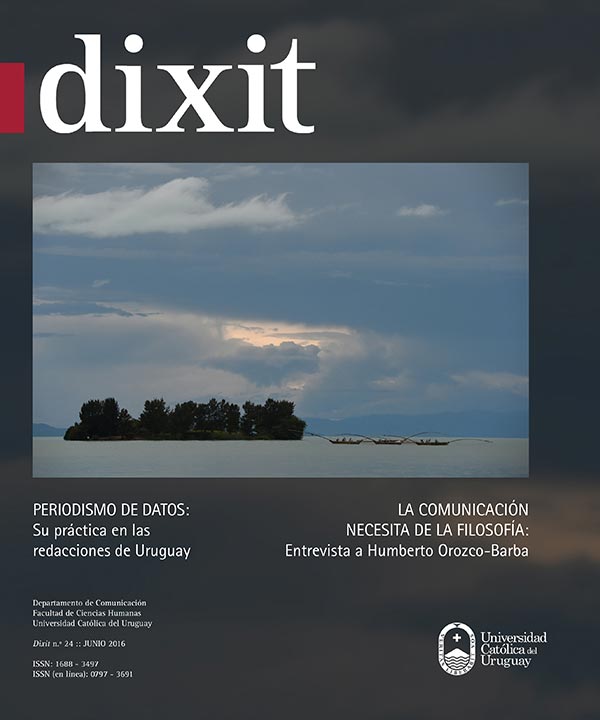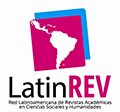Data Journalism in Uruguay
DOI:
https://doi.org/10.22235/d.v0i24.1167Keywords:
new media, digital journalism, journalism in Uruguay, scientific journalism, data journalismAbstract
The term “data journalism” arrived to newsrooms some time
ago, and now every news media wants be part of it. In a
small country like Uruguay —despite the isolated efforts
of some companies, NGOs and government agencies— it
has still not found its place in the media. This research tries
to clarify the concept of data journalism in order to break
down the state of the art in Uruguay, through interviews
with journalists, members of NGOs and members of the academic
staff of the universities where the future journalists
are being formed. Thus being able to point out the impulses
and obstacles data journalism has encountered in order to
foresee its possible future.
Keywords:
Downloads
References
British Broadcasting Corporation (2011, octubre 27). The world at seven billion. Recuperado de http://www.bbc.co.uk/news/world-15391515
Bounegru, L., Lorenz, M., Rütten, W. (2010). Data-driven journalism: What is there to learn? Hudson, H. (Ed.) A paper on the data-driven journalism roundtable held in Amsterdam on 24 August 2010 ( p. 78). Ámsterdam: EJC.
Dader, J. L., Gómez, P. (1993). «Periodismo de Precisión»: una nueva metodología para transformar el periodismo. Anàlisi, 15, 99–116.
Data Uruguay (s. f.). A Tu Servicio. Recuperado de http://www.datauy.org/portfolio/a-tu-servicio
Fernández, M. (2014). Acceso a la Información Pública en Uruguay. Perry, F., Paz, M. (Eds.). Manual de Periodismo de Datos Iberoamericano. Recuperado de http://manual.periodismodedatos.org
Gray, J., Bounegru, L., Chambers, L. (2012). The Data Journalism Handbook. Recuperado de http://datajournalismhandbook.org
IAB Uruguay (2015). Socios. Recuperado de http://www.iab.com.uy/socios/
Kuutti, T., Heikki, U. (2015). Models and streams of data journalism. The Journal of Media Innovations, 2 (1), 77–88.
Lorenz, M. (2010, junio). Data-driven journalism: What is there to learn? Stanford: IJ-7. Recuperado de http://www.slideshare.net/mirkolorenz/datadriven-journalismwhat-
is-there-to-learn
Martinho, A. P. (2014). Jornalismo de dados: caraterização e fluxos de trabalho. Exedra, 9, 64–73.
Meyer, P. (1991). The New Precision Journalism. Recuperado de http://www.unc.edu/~pmeyer/book
Open Knowledge (2015). Uruguay is ranked #7 in the 2015 Index. Recuperado el 18 de diciembre, 2015, de http://index.okfn.org/place/uruguay
Piñeiro Rodríguez, R., Rossel, C. (2014). Del dicho al hecho: derecho de acceso a la información pública en Uruguay. Recuperado de http://library.fes.de/pdf-files/bueros/uruguay/11587.pdf
Poder Legislativo (2008, noviembre 7). Ley 18.381. Recuperado de https://parlamento.gub.uy/documentosyleyes
Ponce, M., Santángelo, G., Pérez, J. (2015). Índice de Transparencia Activa en Línea 2014. CAInfo, Universidad Católica del Uruguay. Recuperado de http://itael.cainfo.org.uy/wp-ontent/uploads/2015/09/%-C3%8Dndice-de-Transparencia-Activa-n-L%-C3%ADnea-2014ok.pdf
Rogers, S. (2011, setiembre 26). The first Guardian data journalism: May 5, 1821. The Guardian. Recuperado de http://www.theguardian.com/news/datablog/2011/sep/26/data-ournalism-guardian
Träsel, M. (2014). Historia del periodismo de datos en Brasil. Perry, F., Paz, M. (Eds.). Manual de Periodismo de Datos Iberoamericano. Recuperado de http://manual.periodismodedatos.org
UyCheck, un sitio de chequeo para una ciudadanía “más crítica.” (2014, octubre 17). El Observador. Recuperado de http://www.elobservador.com.uy/uycheck-un-sitio-chequeo-una-ciudadania-mas-critica-n290162
Yagoda, B. (2014, marzo 6). A short history of “hack”. The New Yorker. Recuperado de http://www.newyorker. com/tech/elements/a-short-history-of-hack
Downloads
Published
How to Cite
Issue
Section
License
From issue number 32 onwards all contents are licensed under the Creative Commons Attribution 4.0 International License (CC BY 4.0).
Issues number 29-31 are licensed under the Creative Commons Attribution-NonCommercial 4.0 International License.
The contents corresponding to number 28 and earlier editions are under the Creative Commons Attribution-NonCommercial-ShareAlike 4.0 International License.


















